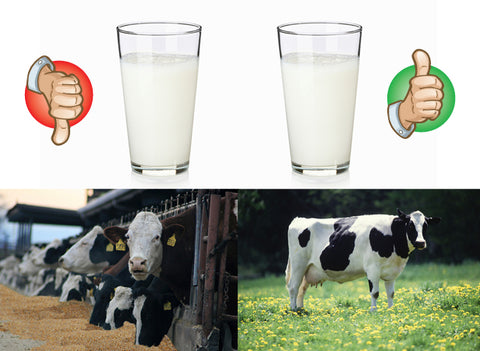
Why do eczema and dry skin flare up during the winter months?
Why do asthma, hay fever and eczema come as a package?
What is the link between eczema and non-organic milk?
Can you really apply raw honey directly onto eczema?
What are three ways to manage eczema and dry skin naturally?
What Is Eczema?

Eczema, also known as atopic dermatitis, is a long-term chronic skin condition that causes the skin to dry out and become red, itchy and cracked. It is common in babies and children, but many adults also suffer from eczema.
Why Do Eczema And Dry Skin Flare Up During The Winter Months?

Winter is not a good time for those with eczema and dry skin. Windows are shut, heating is on, clothes are on and the air is dry. All contribute to drying out the skin from its natural moisture and inflaming any patches of eczema.
Why Do Asthma, Hay Fever And Eczema Come As A Package?
Eczema is usually present in people who are sensitive to allergens. Since asthma and hay fever are also atopic – caused by sensitivity to allergens – the three conditions often come together.
Here are three easy things you can do to manage eczema and dry skin naturally:
1. Switch To Organic Milk

What is the link between eczema and non-organic milk?
Eczema symptoms are often made worse by triggers. These triggers are not only external, such as soaps and weather conditions, but also internal. Stress and sensitivity to certain foods also tend to cause eczema to flare up.
Cow’s milk and dairy products are often blamed by eczema sufferers as a trigger for flare-ups. Many people claim to be intolerant, or sensitive, to cow’s milk. Whenever they drink cow’s milk, it aggravates their eczema and acne, and causes indigestion, diarrhoea and bloating.
“Cut out cow’s milk,” people advise. “Cut out dairy.” “Only drink soya or other milks.”
However, contrary to popular belief, it is not cow’s milk that is the culprit, but the hormones in non-organic cow’s milk that wreck the body’s internal balances.

Most regular cow’s milk comes from cows that are fed artificial hormones, antibiotics and steroids in order to increase their milk production in both quantity and frequency.
Consider this. The weight of an average cow is ten times that of an average human. If artificial hormones, antibiotics and steroids have an effect on cows, their effect on the human body will be ten times more than on cows.
Eczema, acne, bloating, gas, asthma… all are conditions thought to be aggravated by non-organic cow’s milk.
Many, many people have found that simply switching from non-organic cow’s milk to organic cow’s milk, a number of their health conditions have simply disappeared, as if by magic.

Just like honey, for milk to be certified organic there are strict standards that the milk producers must adhere to in relation to their cows. They must not treat their cows with artificial hormones, or if they do, they must wait a number of months between the treatment and milking the cow.
This ensures that the hormones are flushed out of the cow’s body before it is milked.
Organic milk is also more nutritious than non-organic milk, containing more Vitamin E, iron and carotenoids than its non-organic counterpart.

A study published in the British Journal of Nutrition in 2016 concluded that organic milk contains about 50% more beneficial omega 3 fatty acids than non-organic milk. Omega 3
A decade ago, organic milk would be double the price of non-organic milk. Today, the price difference between non-organic and organic cow’s milk is only 40% in many major supermarkets.
One of the easiest and cheapest changes anyone, not just eczema sufferers, can make to their diet is simply to switch to organic cow’s milk.
2. Apply Raw Organic Honey Directly Onto Eczema Daily

Eczema damages the layers of the skin. Dry skin, inflammation, itching, all damage the skin and expose it to more inflammation. It’s a vicious circle. The skin itches, you scratch it, this damages it further, so it itches again, you scratch it and so on.
Eczema sufferers spend a lot of money and time on buying and applying aqueous creams onto their inflamed skin.
Applying raw organic honey onto eczema is not only cheaper than aqueous creams, it is also natural and free of artificial chemicals.

Raw organic honey contains living nutrients, enzymes and bacteria that nourish, heal and repair the skin layers damaged by eczema. Coarsely filtered honey also contains propolis, which is resinous glue-like mixture that bees use to seal open spaces in their hives and protect it from infection.
Artificially produced creams do not contain any living substances so while they do have an effect on damaged skin, their effect is very superficial.
One of the best honeys to apply directly onto eczema is Raw Organic Rivera Gum Honey from Uruguay. One of the world’s purest eucalyptus honeys, it has a thick consistency which makes it easy to apply directly onto the skin.
Here are some guidelines on how to apply raw organic honey on eczema;
Face: apply a thin layer of raw organic honey directly onto the eczema, leave on for 20 minutes then wash (or lick!) off.
Arms, legs, other areas: apply a thin layer of raw organic honey directly onto the eczema, cover with clothes to avoid spoiling bedsheets, leave on overnight then wash off in the morning.
Raw organic honey is also safe to apply onto eczema on the skin of babies. However, it is important to avoid putting raw honey anywhere near the mouth of babies where they could ingest it. Raw honey is considered unsuitable for infants under the age of 12 months due to the risk of botulism.
It is also recommended to apply eczema on babies when they are awake, not asleep, and not to leave eczema on babies for too long as the stickiness could upset them.

3. Detox Your Liver By Drinking Raw Organic Honey Water Every Day
Applying substances directly onto eczema can provide relief to the symptoms of eczema and, in the case of raw organic honey, even repair the skin. But they do not get to the root cause of what is causing the eczema in the first place.
A toxic liver caused by a diet high in sugar, processed foods, caffeine, non-organic cow’s milk or alcohol, compromises the ability of the body to manage conditions such as eczema.

Dermatoxins are released from the liver and try to exit the body via the skin.
Drinking a glass of raw organic honey water once a day first thing in the morning before breakfast can help to detox the liver and make it more efficient.
As hay fever is commonly linked to eczema, it is possible that anything that alleviates the symptoms of hay fever would have a similar effect on the symptoms of eczema.
To make raw organic honey water, simply mix a teaspoon of raw organic honey into a glass of warm (not hot) water, maximum 40C, and drink it first thing in the morning before breakfast, and before anything else enters your body. The effects are amplified if you are able to leave at least 30 minutes between drinking the honey water and eating or drinking something else.
Other Dietary Changes To Relieve Eczema And Dry Skin
There are some other dietary changes that you can make to help relieve eczema and dry skin:
1. Stop using vegetable seed oils such as sunflower oil, rapeseed oil, corn oil, canola oil, etc. Seed oils are highly processed and carry a lot of toxins. They put the body under oxidative stress, which inflames eczema.
Use natural oils such as dairy butter and ghee, or coconut oil, or olive oil.
2. Eat more probiotics in the form of fermented foods such as kefir yoghurt, kimchi and sauerkraut. Probiotics work with prebiotics to heal leaky guts. You know you have a leaky gut if you suffer a lot from bloating, gas and indigestion.
3. Take extra omega 3 oil, vitamin D, magnesium and iron. A daily Vitamin D spray in the morning builds the body’s immune system. Spraying magnesium oil directly onto the skin at night helps the body sleep and repair. Iron keeps the blood healthy and omega 3 oil keeps the harmful fats in the body low.





